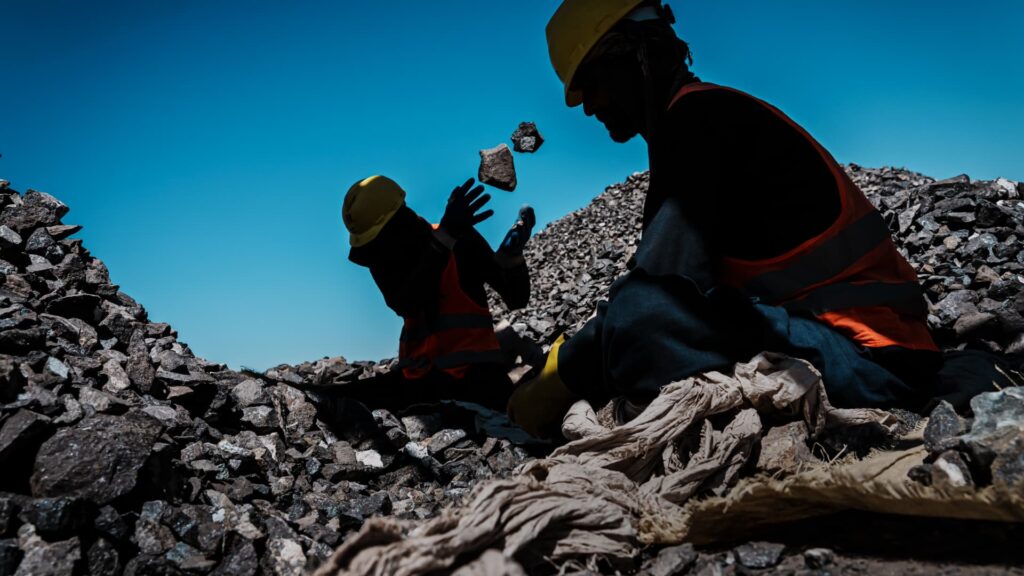In Tianjin, China, Chen Jialong, production manager at Neo Material Technologies’ Magnequench Tianjin factory, opens a barrel of neodymium iron boron magnets that are annealed before being ground into powder.
Bloomberg | Bloomberg | Getty Images
US President Donald Trump’s efforts to secure rare earth supply deals across Asia will ultimately weaken China’s dominance in global supply chains for critical minerals, but analysts say it will take years to accumulate.
Over 10 days, President Trump struck deals with Australia, Malaysia, Cambodia, and most recently Japan to boost supplies of rare earths and other critical minerals essential to making batteries, cars, defense systems, and computing chips.
The series of deals is part of Washington’s efforts to counter Beijing’s stranglehold on the sector and comes ahead of talks with Chinese President Xi Jinping in Busan on Thursday.
Wendy Cutler, senior vice president at the Asia Society Policy Institute, said the deal “has the potential to reap significant benefits from being tied together in a multilateral agreement with strong commitments, financing, and pooling of resources.” He expects more such deals to occur under the Trump administration.
Trump and Xi are expected to address several contentious issues that have stalled long-running trade talks, including Beijing’s rare earth export restrictions and Washington’s tariff threats and technology restrictions.
In the medium term, they will move away from China’s supply chain, but in the short term they will still be highly dependent on China.
Dennis Wilder
Georgetown University Senior Research Fellow
President Trump’s latest victory was an agreement with Japan aimed at securing supplies of critical raw and processed minerals, as well as pledging funding for selected projects within the next six months. Previous agreements with Australia, Malaysia and Thailand also outlined multibillion-dollar programs, commitments to fair trade practices and avoiding export bans and export quotas.
President Trump’s deal could bring much-needed financial support to the industry and ultimately challenge Beijing’s control over rare earths, but experts said the effort would be expensive and take years to bear fruit.
“What we’re trying to do now is move away from China as a major supply chain, and that’s going to take time,” said Dennis Wilder, a former senior intelligence official and current senior fellow at Georgetown University.
“In the medium term, we will move away from Chinese supply chains, but in the short term we will still be highly dependent on China,” Wilder said.
Goldman Sachs estimates that developing new rare earth mines tends to take up to 10 years and that known reserves of certain elements are “extremely scarce” outside of Myanmar and China, while building a refinery will take around five years.
The bank estimates that China controls 69% of the market share in rare earth mining, 92% in refining and 98% in magnet manufacturing.
level playing field
Brody Sutherland, CEO of Patriot Critical Minerals, a U.S.-based critical minerals development company, said the deals are “game changers” that will reduce U.S. vulnerability to Chinese government export restrictions, stabilize rare earth prices, and accelerate domestic innovative refining and recycling.
Sutherland said reliable access to raw materials from friendly countries allows U.S. companies to focus on efficient mining, ethical mining and value-added processing.
He also cited long-term benefits such as lower risk premiums for financing, faster approval of new locations and a “level playing field with subsidized foreign competitors.”
Mike Rosenberg, a strategic management professor at IESE Business School, said China has allowed rare earth prices to fluctuate in a highly “strategic” way to make projects in other countries unprofitable.
By using public funds to support these projects, the world’s miners and refiners should be able to make investments that guarantee reasonable returns, Rosenberg added.
But experts say efforts to diversify and reshor production inevitably mean accepting environmental trade-offs.
Rosenberg noted that mining and refining rare earth materials in an environmentally friendly manner is “very expensive,” but China keeps costs low by restricting environmental regulations.
“Consumers may have to accept higher prices for electronics and green technologies that reflect their actual material and environmental costs,” said Patrick Schroeder, senior research fellow at the Chatham House Center for the Environment and Society.
This policy push has also accelerated the rise in the stock prices of several US-listed rare earth mining companies this year. New York-listed stocks of MP material and Trilogy Metal each more than quadrupled, energy fuel It has tripled, but important metals U.S. rare earths are up nearly 90% and U.S. rare earths are up about 75%, according to LSEG data.
wake up call
Analysts said Trump likely rushed to sign these deals to gain influence ahead of his meeting with Xi in Seoul this week.
Earlier this week, U.S. officials said they expected China to delay imposing export restrictions on critical minerals by a year as part of a broader trade deal, temporarily dampening gains in mining stocks.

“Beijing’s recent threat of broad extraterritorial export controls in this sector is a necessary wake-up call to partners around the world,” said Cutler of the Asian Social Policy Institute.
Georgetown University’s Wilder said China may have made a miscalculation with the export restrictions that have disrupted the global economy and extended the trade war to other countries, and that “that is not in China’s interest.”
“It was a useful weapon when it targeted the United States, but its usefulness diminishes when you try to extend it to the rest of the world,” Wilder said. “Because you bring the rest of the world to the United States in many different ways.”

